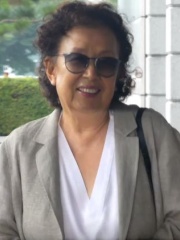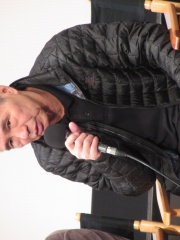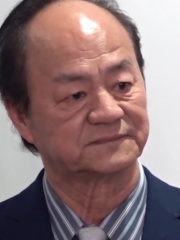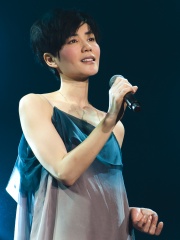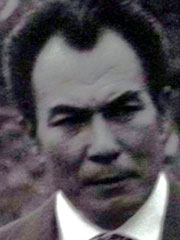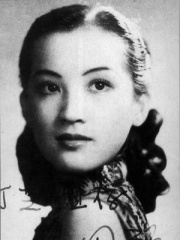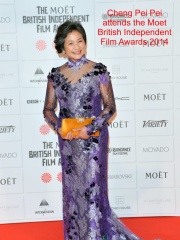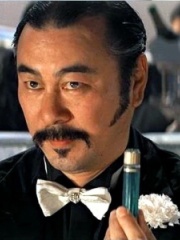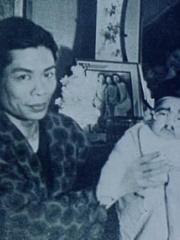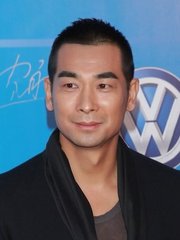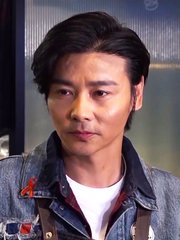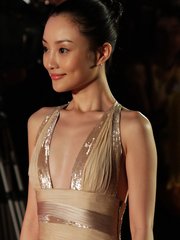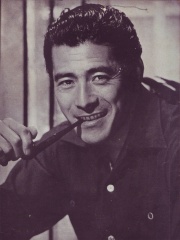

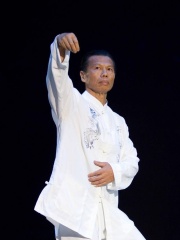
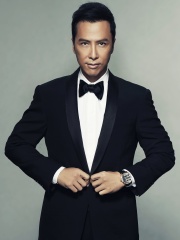
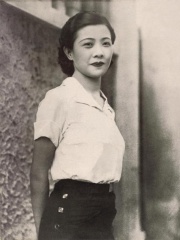

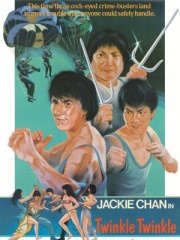
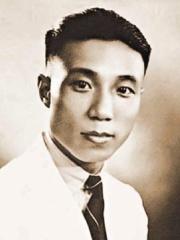
The Most Famous
ACTORS from China
Top 10
The following people are considered by Pantheon to be the top 10 most legendary Chinese Actors of all time. This list of famous Chinese Actors is sorted by HPI (Historical Popularity Index), a metric that aggregates information on a biography's online popularity. Visit the rankings page to view the entire list of Chinese Actors.

1. Toshiro Mifune (1920 - 1997)
With an HPI of 79.11, Toshiro Mifune is the most famous Chinese Actor. His biography has been translated into 121 different languages on wikipedia.
Toshiro Mifune (三船 敏郎, Mifune Toshirō; 1 April 1920 – 24 December 1997) was a Japanese actor and producer. The recipient of numerous awards and accolades over a lengthy career, he is widely considered one of the greatest actors of all time. He often played hypermasculine characters and was noted for his commanding screen presence in the Japanese film industry. Although he amassed more than 180 screen credits, Mifune is best known for his 16 collaborations with director Akira Kurosawa. These collaborations included Kurosawa's critically acclaimed jidaigeki films such as Rashomon (1950), for which Mifune won the San Marco Golden Lion at the Venice Film Festival, Seven Samurai (1954), Throne of Blood (1957), The Hidden Fortress (1958), and Yojimbo (1961), for which Mifune won the Volpi Cup for Best Actor at the Venice Film Festival and was recognised at the Blue Ribbon Awards as Best Actor. He also portrayed Miyamoto Musashi in Hiroshi Inagaki's Samurai Trilogy (1954–1956), Lord Toranaga in the NBC television miniseries Shōgun, and Admiral Isoroku Yamamoto in three different films. In 1962, he established Mifune Productions, achieving success with large-scale works including The Sands of Kurobe (1968) and Samurai Banners (1969). He also starred in his directorial debut Legacy of the 500,000 (1963). Following his performance in the 1965 film Red Beard, which won him the Best Actor at the Venice Film Festival for a second time, Mifune turned to roles abroad. He starred in films such as Ánimas Trujano (1962), for which he won another Blue Ribbon Award for Best Actor, Grand Prix (1966), which was his Hollywood debut, Hell in the Pacific (1968), Red Sun (1971), Paper Tiger (1975), Midway (1976), and Steven Spielberg's 1941 (1979). Mifune died of organ failure on December 24, 1997. In 1999, he was inducted into the Martial Arts History Museum Hall of Fame. He is the subject of the featured-length documentary, Mifune: The Last Samurai (2015), about his life and his films. In 2016, his name was inscribed on the Hollywood Walk of Fame.

2. Jet Li (b. 1963)
With an HPI of 74.76, Jet Li is the 2nd most famous Chinese Actor. His biography has been translated into 111 different languages.
Jet Li Lianjie (courtesy name Yangzhong; born 26 April 1963) is a martial artist, actor, and philanthropist. With a career spanning more than forty years, he is regarded as one of the most iconic Chinese film stars and one of the greatest martial artists in the history of cinema. His film career in Asia is credited with reviving Hong Kong kungfu films as well as Shaolin Temple. Li was trained as a wushu athlete at the Beijing Shichahai Sports School and went on to win multiple national championships with the Beijing Wushu Team between 1974 and 1979. After his retirement from the sport in 1979, he made his acting debut with the Hong Kong film Shaolin Temple (1982), a runaway success followed by two sequels in 1984 and 1986. Li established himself as a leading action star with the Once Upon a Time in China series (1991–1993), in which he portrayed Chinese folk hero Wong Fei-hung, followed by Born to Defence (1988), which is his directorial debut, Swordsman II (1992), Fong Sai-yuk (1993), Fist of Legend (1994), High Risk (1995), Black Mask (1996), and Hitman (1998). Li made his Hollywood debut as a villain in Lethal Weapon 4 (1998), followed by his first Hollywood leading role in Romeo Must Die (2000). He went on to star in international productions such as Luc Besson-produced films Kiss of the Dragon (2001) and Unleashed (2005). He returned to Asia with Hero (2002), followed by Fearless (2006) and The Warlords (2007). In 2008, he starred in The Mummy: Tomb of the Dragon Emperor and The Forbidden Kingdom, which marked his first collaboration with fellow kungfu star Jackie Chan. From 2010 to 2014, he appeared in the first three of the action film series The Expendables. As a philanthropist, Li founded One Foundation in 2007, which was registered in 2011 as the first private charitable fundraising organization in China. He also co-founded Taiji Zen, an online health program providing instruction in meditation and tai chi. Li topped Forbes's list of China's richest stars in 2004 and ranked 10th on the Forbes China Celebrity 100 list in 2004, 3rd in 2008, 6th in 2009, 24th in 2010, 8th in 2011, 22nd in 2012, and 41st in 2013. He was named by Time magazine as one of the 100 most influential people in 2010.

3. Bolo Yeung (b. 1946)
With an HPI of 71.43, Bolo Yeung is the 3rd most famous Chinese Actor. His biography has been translated into 32 different languages.
Yeung Sze (simplified Chinese: 杨斯; traditional Chinese: 楊斯; Jyutping: joeng4 si1; pinyin: Yáng Sī; born February 7, 1946), better known as Bolo Yeung, is a Hong Kong former competitive bodybuilder, martial artist, and actor. Primarily known for playing villains in action and martial arts films, he is regarded as one of the most influential actors in martial arts cinema. Born in Meizhou, Sze learned kung fu, namely Tai chi and Wing Chun, from the age of 10. After relocating to Hong Kong to escape the famine and communism of mainland China, he developed an interest in bodybuilding and in 1970 he was crowned Mr. Hong Kong, a title he would hold for 10 years. He became an actor and stuntman for the Shaw Brothers with notable early performances in films including The Heroic Ones (1970) and The Deadly Duo (1971). In 1973, he appeared as the henchman "Bolo" in Bruce Lee's Enter the Dragon, which catapulted him to international fame. Throughout the 1970s and 1980s he appeared in many Bruceploitation films, including The Clones of Bruce Lee (1977) and Enter the Game of Death (1978). He made his directorial debut in 1977 with the film Fists of Justice. He later appeared in Golden Harvest action comedies of the 1980s, including the Sammo Hung films My Lucky Stars (1985) and Millionaires Express (1986), and he duelled with Bruce Lee's son, Brandon Lee, in the action film Legacy of Rage (1986). He gained further popularity in the West following the international success of the 1988 martial arts film Bloodsport, in which he played the villain Chong Li, opposite Jean-Claude Van Damme. His work in Hollywood also includes the 1991 films Double Impact, also opposite Van Damme, and Breathing Fire, Ironheart (1992) and work with Lebanese-Canadian filmmaker Jalal Merhi, beginning with Fearless Tiger (1991).

4. Donnie Yen (b. 1963)
With an HPI of 69.38, Donnie Yen is the 4th most famous Chinese Actor. His biography has been translated into 62 different languages.
Donnie Yen Chi-tan (Chinese: 甄子丹; Jyutping: jan1 zi2 daan1; pinyin: Zhēn Zǐdān; born 27 July 1963) is a Hong Kong actor, filmmaker, martial artist, and action director. His accolades include three Golden Horse Awards and five Hong Kong Film Awards. He is best known for portraying Wing Chun grandmaster Ip Man in the Ip Man film series, namely Ip Man (2008), Ip Man 2 (2010), Ip Man 3 (2015), and Ip Man 4: The Finale (2019). He also served as a co-producer of the spin-off Master Z: Ip Man Legacy (2018). Born in Guangdong, Yen developed an interest in martial arts at a young age, and began experimenting with various styles, including tai chi and other traditional Chinese martial arts. At age 18, he auditioned for action choreographer Yuen Woo-ping in Hong Kong. He landed his first starring role in the 1984 Hong Kong martial arts action film Drunken Tai Chi. He made his breakthrough role as the antagonist General Nap-lan in Once Upon a Time in China II (1992), opposite Jet Li's character. He appeared in several other Hong Kong kung fu films, including Iron Monkey (1993) and Wing Chun (1994). In 1997, he starred in his directorial debut film Legend of the Wolf. Yen made his American debut in Highlander: Endgame (2000), followed by a cameo in Blade II (2002). He went on to appear in the American films Shanghai Knights (2003), Rogue One (2016), XXX: Return of Xander Cage (2017), Mulan (2020), and John Wick: Chapter 4 (2023). He has continued to be active in Hong Kong cinema, appearing in the well-received films Hero (2002), SPL: Sha Po Lang (2005), Flash Point (2007), 14 Blades (2010), Wu Xia (2011), Kung Fu Jungle (2014), Chasing the Dragon (2017), Enter the Fat Dragon (2020), Raging Fire (2021), and The Prosecutor (2024), among others. In television, Yen portrayed fictional character Chen Zhen in the television series Fist of Fury (1995); he reprised the role in the 2010 film Legend of the Fist: The Return of Chen Zhen. For portraying Ip Man in the Ip Man film series (2008–2019), Yen is credited by many for contributing to the popularisation of Wing Chun in China. Alongside Kung fu, particularly Wing Chun, Yen is also known for incorporating mixed martial arts (MMA) elements into his action choreography. Aside from his acting, in 1997, he established his own production company, Bullet Films, which choreographed the action for Western blockbusters like Blade II (2002) and Stormbreaker (2006).
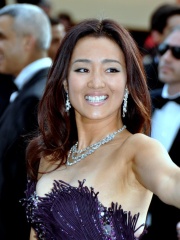
5. Gong Li (b. 1965)
With an HPI of 67.37, Gong Li is the 5th most famous Chinese Actor. Her biography has been translated into 65 different languages.
Gong Li (simplified Chinese: 巩俐; traditional Chinese: 鞏俐; born 31 December 1965) is a Chinese-born actress. Known for her versatility and naturalistic performances, she is regarded as one of the best actresses in Chinese cinema. She starred in three of the four Chinese-language films that have been nominated for the Academy Award for Best International Feature Film. Gong was born in Shenyang, Liaoning, and grew up in Jinan, Shandong. She enrolled at the Central Academy of Drama in Beijing, from where she graduated in 1989. While a student at the academy, she was spotted by director Zhang Yimou and debuted in Zhang's Red Sorghum in 1987. Gong and Zhang's professional and personal relationship received much coverage in the Chinese-speaking world, as they continued to collaborate on a string of critically acclaimed movies, including the Oscar-nominated features Ju Dou (1990) and Raise the Red Lantern (1991). For her role in the Zhang-directed The Story of Qiu Ju (1992), Gong won the Volpi Cup for Best Actress at the Venice Film Festival. Gong also starred in the Chen Kaige-directed Oscar-nominated Farewell My Concubine (1993), for which she won Best Supporting Actress at the New York Film Critics Circle Awards. In English-language films, she won the National Board of Review Award for Best Supporting Actress for Memoirs of a Geisha (2005), directed by Rob Marshall. Other notable appearances include Flirting Scholar (1993), To Live (1994), Chinese Box (1997), The Emperor and the Assassin (1998), Breaking the Silence (2000), Zhou Yu's Train (2003), Eros (2004), Miami Vice (2006), Curse of the Golden Flower (2006) and Saturday Fiction (2019). Gong was the head of jury at the 2000 Berlin Film and the 2002 Venice Film Festivals, the first Asian to hold such a position for either event. Over the course of her career, Gong won several accolades, including four Hundred Flowers Awards, a Hong Kong Film Award, two Golden Rooster Awards, a Berlin Film Festival, two Cannes Film Festival and Venice Film Festival honors and a David di Donatello Award nomination. She was appointed as a Commander (Commandeur) of the Ordre des Arts et des Lettres by the government of France in 2010.

6. Ruan Lingyu (1910 - 1935)
With an HPI of 65.17, Ruan Lingyu is the 6th most famous Chinese Actor. Her biography has been translated into 29 different languages.
Ruan Lingyu (born Ruan Fenggen; April 26, 1910 – March 8, 1935), also known by her English name Lily Yuen, was a Chinese silent film actress. One of the most prominent Chinese film stars of the 1930s, her exceptional acting ability and suicide at the age of 24 led her to become an icon of Chinese cinema.

7. Yuen Siu-tien (1912 - 1979)
With an HPI of 64.61, Yuen Siu-tien is the 7th most famous Chinese Actor. His biography has been translated into 17 different languages.
Yuen Siu-tien (Chinese: 袁小田) (27 November 1912 – 8 January 1979) (also known as Yuan Xiaotian, Simon Yuen, Sam Seed or "Ol' Dirty") was a Hong Kong actor and martial artist. In the late 1970s, Yuen is perhaps best known as Beggar So (a.k.a. Sam Seed) in three films: Drunken Master, Story of Drunken Master and his final film Dance of the Drunk Mantis. He starred in several films with film actors like Jackie Chan and under the direction of his real-life son Yuen Woo-ping.

8. Yuen Biao (b. 1957)
With an HPI of 64.46, Yuen Biao is the 8th most famous Chinese Actor. His biography has been translated into 31 different languages.
Ha Lingchun (born 26 July 1957), known professionally as Yuen Biao, is a Hong Kong actor, martial artist and stuntman. He specialises in acrobatics and Chinese martial arts and has also worked on over 80 films as actor, stuntman and action choreographer. He was one of the Seven Little Fortunes from the China Drama Academy at the Peking Opera School along with his "brothers" Sammo Hung and Jackie Chan. Throughout the 1980s, he was part of the "Three Dragons" along with Chan and Hung; the three starred in six Hong Kong films together. Yuen Biao has appeared in over 130 films. He has played roles in eight television series for the Hong Kong channel TVB.

9. Run Run Shaw (1907 - 2014)
With an HPI of 64.24, Run Run Shaw is the 9th most famous Chinese Actor. His biography has been translated into 35 different languages.
Sir Run Run Shaw (born Shao Renleng; 19 November 1907 – 7 January 2014), also known as Shao Yifu and Siu Yat-fu, was a Hong Kong businessman, filmmaker, and philanthropist. He was one of the foremost influential movie moguls in the East Asian and Hong Kong entertainment industry. He founded the Shaw Brothers Studio, one of the largest film production companies in Hong Kong, and TVB, the dominant television company in Hong Kong. A well-known philanthropist, Shaw donated billions of Hong Kong dollars to educational institutions in Hong Kong and mainland China. More than 5,000 buildings on Chinese college campuses bear his name, as does Shaw College of the Chinese University of Hong Kong. He also established the Shaw Prize for Astronomy, Life Science & Medicine and Mathematical Sciences.
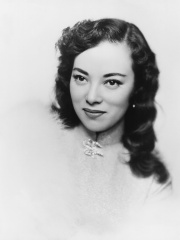
10. Yoshiko Yamaguchi (1920 - 2014)
With an HPI of 63.97, Yoshiko Yamaguchi is the 10th most famous Chinese Actor. Her biography has been translated into 29 different languages.
Yoshiko Yamaguchi (Japanese: 山口淑子 Yamaguchi Yoshiko; Chinese: 山口淑子 Shānkǒu Shūzǐ; 12 February 1920 – 7 September 2014) was a Japanese singer, actress, journalist, and politician. Born in China, she made an international career in film in China, Hong Kong, Japan and the United States. Early in her career, the Manchukuo Film Association concealed her Japanese origin and she went by the Chinese name Li Hsiang-lan (李香蘭), rendered in Japanese as Ri Kōran. This allowed her to represent China in Japanese propaganda movies. After the war, she appeared in Japanese movies under her real name, as well as in several English language movies under the stage name, Shirley Yamaguchi. After becoming a journalist in the 1950s under the name Yoshiko Ōtaka (大鷹 淑子, Ōtaka Yoshiko), she was elected as a member of the Japanese parliament in 1974, and served for 18 years. After retiring from politics, she served as vice president of the Asian Women's Fund.
People
Pantheon has 138 people classified as Chinese actors born between 1901 and 2000. Of these 138, 111 (80.43%) of them are still alive today. The most famous living Chinese actors include Jet Li, Bolo Yeung, and Donnie Yen. The most famous deceased Chinese actors include Toshiro Mifune, Ruan Lingyu, and Yuen Siu-tien. As of April 2024, 22 new Chinese actors have been added to Pantheon including Yu Menglong, Vincent Zhao, and Zhang Jin.
Living Chinese Actors
Go to all RankingsJet Li
1963 - Present
HPI: 74.76
Bolo Yeung
1946 - Present
HPI: 71.43
Donnie Yen
1963 - Present
HPI: 69.38
Gong Li
1965 - Present
HPI: 67.37
Yuen Biao
1957 - Present
HPI: 64.46
Na Moon-hee
1941 - Present
HPI: 63.12
Hou Hsiao-hsien
1947 - Present
HPI: 63.04
Joan Chen
1961 - Present
HPI: 62.38
Ti Lung
1946 - Present
HPI: 62.37
James Tien
1942 - Present
HPI: 61.61
Faye Wong
1969 - Present
HPI: 61.27
Zhang Ziyi
1979 - Present
HPI: 60.64
Deceased Chinese Actors
Go to all RankingsToshiro Mifune
1920 - 1997
HPI: 79.11
Ruan Lingyu
1910 - 1935
HPI: 65.17
Yuen Siu-tien
1912 - 1979
HPI: 64.61
Run Run Shaw
1907 - 2014
HPI: 64.24
Yoshiko Yamaguchi
1920 - 2014
HPI: 63.97
Shih Kien
1913 - 2009
HPI: 63.70
Zhou Xuan
1920 - 1957
HPI: 63.23
Cheng Pei-pei
1946 - 2024
HPI: 62.96
Roy Chiao
1927 - 1999
HPI: 62.24
Kenneth Tsang
1935 - 2022
HPI: 61.64
Lee Hoi-chuen
1901 - 1965
HPI: 61.31
Lau Kar-leung
1934 - 2013
HPI: 60.25
Newly Added Chinese Actors (2025)
Go to all RankingsYu Menglong
1988 - 2025
HPI: 52.23
Vincent Zhao
1972 - Present
HPI: 48.40
Zhang Jin
1974 - Present
HPI: 48.36
Zhao Lusi
1998 - Present
HPI: 47.60
Yu Nan
1978 - Present
HPI: 46.44
Huang Shengyi
1983 - Present
HPI: 44.89
Gülnezer Bextiyar
1992 - Present
HPI: 44.81
Li Xiaolu
1982 - Present
HPI: 44.30
Gong Jun
1992 - Present
HPI: 43.42
Huang Jingyu
1992 - Present
HPI: 43.38
Lin Gengxin
1988 - Present
HPI: 43.16
Zhang Yuqi
1987 - Present
HPI: 41.63
Overlapping Lives
Which Actors were alive at the same time? This visualization shows the lifespans of the 25 most globally memorable Actors since 1700.

